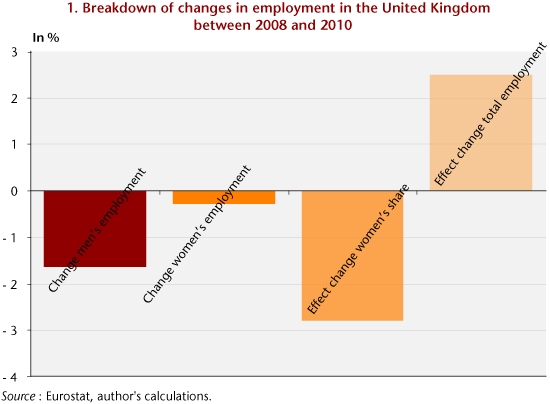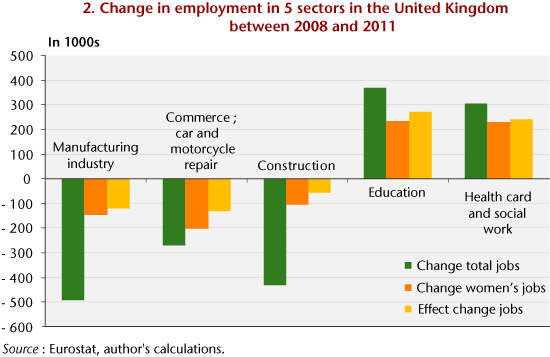The crisis in the United Kingdom: are women less affected than men?
In most European countries the crisis has hit the employment of men more than women. The United Kingdom is no exception: in the population aged 15 and older, between 2008 and 2011 men’s employment declined by 1.6%, against a loss of only 0.3% for women. One could therefore conclude that women have been better sheltered than men from the storm that is battering the labour market in the UK, and more generally in Europe. In absolute terms this is indisputable, but from a larger perspective nothing is less certain.
The gendered impact of the crisis on employment is largely due to the segmentation of the labour market: women and men are not involved in the same sectors of activity; the sectors in which women are over-represented have been less affected by the crisis because of the nature of these jobs. In the UK, women hold 78% of the jobs in “Health care and social work” and 72% in the field of ”education”. These fields rely heavily on public or semi-public sector employment and are less exposed to the vagaries of the economic cycle: between 2008 and 2011, employment in the “health and social work” sector increased by almost 8%, and over 12% in education. Conversely, women represent only 11% of workers in construction and 14% in industry, the sectors that have borne the brunt of the job cuts (respectively, -19.6% and -17.3% over the same period). Women thus appear to have been protected from the effects of the crisis in employment due to their over-representation in sectors where employment is less responsive to economic fluctuations. The story could end there, but things are never as simple as they seem, because this explanation remains valid only if the proportion of women in each sector had remained the same during the crisis. But it hasn’t.
A statistical breakdown of changes in employment can help to distinguish what part of the change in employment is due to the change in total employment and what part is due to the change in the proportion of women in each sector. It is clear from Figure 1 that if the proportion of women in each sector had remained constant between 2008 and 2011, then women’s employment would not have decreased by 0.3% over the period but instead would have increased by 2.5%; the decline in the employment of women over the period, though low, is due to a change in their share in certain sectors.
If we look more closely at the sectors that weigh more heavily in the total number of jobs, we find that in construction and industry women were more affected by job cuts then they should have been given their under-representation in these sectors in 2008. In particular, the collapse of employment in construction and industry has disproportionately affected women. The sectors where women have a heavy presence benefited on the contrary from strong job creation from 2008 to 2011: 370,000 more jobs in education and almost 305,000 more in health care and social work. But the jobs created did not benefit women as much as they should have given their share in these types of activity in 2008. Figure 2 shows that in education, the number of jobs held by women would have increased by 271,000 if their share in education had remained the same, whereas the number of additional jobs between 2008 and 2011 that went to women was only 231,700.
In summary, then, in sectors hit especially sharply by the crisis women were over-affected by the job destruction, and in sectors where employment remained dynamic they benefited less than they should have. So ultimately, in terms of absolute employment women suffered less than men, but relatively speaking they were affected more. The segmentation of the labour market that has a significant effect on job equality between men and women has not proved to be an effective shield for women’s employment during the crisis.

